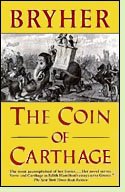The Coin of Carthage
by Bryher
Reviewed by David Maclaine

The Coin of Carthage is the perfect complement to a novel such as Durham's Pride of Carthage, which treats Hannibal's war against Rome from the viewpoint of central players in that great drama. Bryher's novel focuses instead on a handful of ordinary people who must survive as best they can in the spaces between the shattering events of that war. The story begins with a Greek trader who finds reason to regret his first attempt to trade with the invading Carthaginians. It soon branches off to involve a wounded Roman soldier he helps and his family. Along the way the trader comes face-to-face with Hannibal himself, though just for a moment before he scurries back to safety at the margins of the continuing war. The narrative eventually shifts to another trader, a friend of the first, who makes a more emphatic crossing of lines by taking up residence in Carthage. That position becomes untenable, and he makes bold moves to extricate himself. Between them, Bryher's people manage to observe, from up close or afar, various ebbs and flows of Hannibal's career, from his victories in southern Italy to his banishment after defeat.
The fate of the brilliant general is, like the travails of our leaders today, mostly in the background as the author's believable characters try to adapt to a world skewed by a long war. Bryher's artistry shows itself in the economical crafting of their personalities, the swift strokes that sketch the shape of full, real lives that extend beyond the pages of the novel. It is a poignant look at the choices people must make when ordinary life is poised on the edge of catastrophe, and is far more moving than the usual work of historical entertainment. The Coin of Carthage is my favorite Bryher novel of those I've read so far, a work of deep human interest with substantial literary merit. (1963, 240 pages)
More about The Coin of Carthage at Powell's Books or Amazon.comThe Coin of Carthage appears on the list of The 50 Best Historical Novels for a Survey of Ancient Roman History
Other novels set in ancient Carthage:
Salammbo by Gustave Flaubert (1862), about a mercenary soldier who falls in love with the daughter of Hamilcar Barca. See review or more info at Powell's Books
Pride of Carthage by David Anthony Durham (2005), about Hannibal and Carthage during the Second Punic War. See review or more info at Powell's Books
Hannibal by Ross Leckie (1996), about the great Carthaginian general and his challenge to Rome. More info
Nonfiction about ancient Carthage:
The Carthaginians by Dexter Hoyos (2010). More info
Carthage Must Be Destroyed: The Rise and Fall of an Ancient Civilization by Richard Miles (2011). More info
The Fall of Carthage by Adrian Keith Goldsworthy (2007). More info
Online:
Carthage at the Ancient History Encyclopedia
Back to Novels of Ancient History
Back to Directory of Book Reviews